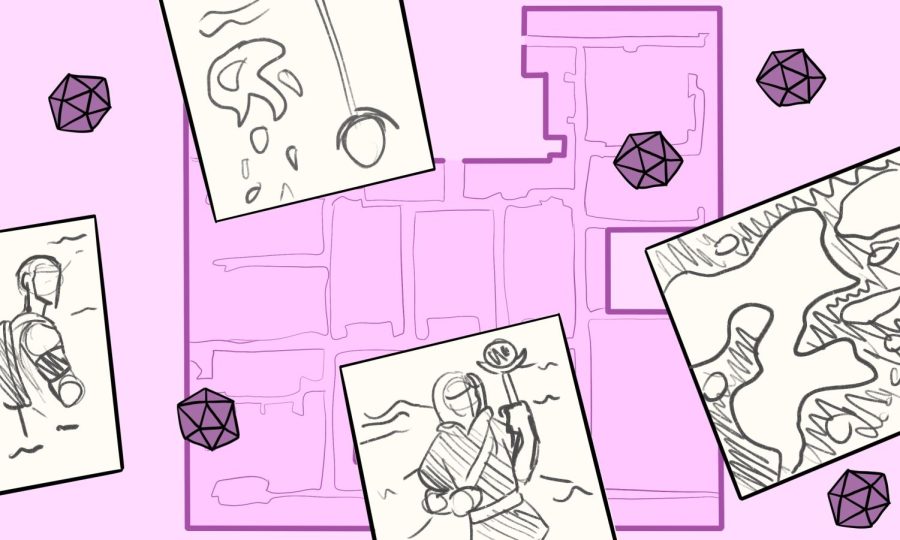Step inside the dungeon: Students talk Dungeons & Dragons at Northwestern
Students at Northwestern spend hours role-playing in Dungeons and Dragons quests.
April 18, 2022
A hundred-year-long science fiction odyssey. A quest to resurrect an orphaned 15-year-old in a medieval fantasy world. A sorcerer named Chad who exclusively wears jorts. What could these things possibly have in common? Students created all three as part of the collaborative storytelling aspect of Dungeons & Dragons.
D&D is a tabletop roleplaying game that debuted in 1974 and has grown in popularity since. In 2020, a record number of people played D&D, according to role-playing game company Wizards of the Coast.
In D&D, players create their own characters, and with the help of a Dungeon Master who oversees the story’s narrative, they work together to accomplish a task over the course of many sessions. Players roll many-sided dice to determine their characters’ powers and actions.
Communication freshman Brenden Dahl said he started playing D&D after a friend recommended it. They had participated in theatre productions before, but had “never really embraced something as truly nerdy as Dungeons & Dragons.”
“When I did (embrace it), I loved it,” Dahl said. “I think it’s a really giving, fun, exciting, silly culture around tabletop games.”
Despite the positive culture, a bevy of stereotypes come with the nerdy image of D&D. In the 1980s, D&D players were suspected of engaging in Satanic rituals, and later on, of being hopelessly nerdy. While the stereotypical D&D player was a middle-school boy — think “Stranger Things” — the demographic of D&D players has since become much less male-dominated. As of 2017, about 40% of D&D players were female.
Weinberg freshman Ayana Davies first encountered D&D during her freshman year of high school and continued to play into her sophomore year. However, the friends she played with were all male, and she attended a boarding school where she wasn’t allowed in the male dorm, she said. So she started her own campaign online.
Davies said D&D is a vehicle for self-expression. She said her online campaign, which she has run for more than two years, encompasses multiple intersections of identity.
“That’s kind of the fun thing about D&D or just any tabletop campaign: You make your character. So you can say, ‘This is who they are,’ and then for like an hour or two, just be like, ‘Guess I’m this person now.’”
Medill freshman Olatunji Osho-Williams decided to create his own campaign and play it with friends when the pandemic started. The original campaign evolved into a hundred-year long odyssey into the world he built.
“It was just a six-month adventure that I’m genuinely never going to forget,” Osho-Williams said. “I was spending wonderful time with my friends.”
His experience as Dungeon Master of that campaign led him to join Tabletop Club at Northwestern, which creates community through board games.
Davies, Dahl and Osho-Williams all acted as Dungeon Masters in their campaigns, meaning they took charge of planning the story, telling it to participants and occasionally problem-solving when characters made unexpected decisions.
For Dahl, who also writes plays, D&D’s collaborative elements are what make it worthwhile.
“For me, that’s what art is — creating to entertain each other,” he said. “And whether that happens on a stage in front of hundreds of people, or in someone’s basement around a table, either way it’s creating stories for one another.”
But all three said the best part of D&D is, of course, the friends they made along the way, even ones that get side-tracked and go off-script — or accidentally summon a god and remake the entire world, as Osho-Williams did.
He wasn’t bothered, though.
“You literally roll with the dice,” he said. “No pun intended.”
Email: [email protected]
Twitter: @MikaEllison23
Related Stories:
— Orcs & Dwarfs & Theatre Dorks
— ‘She Kills Monsters’ brings ‘Dungeons & Dragons’ game to life


